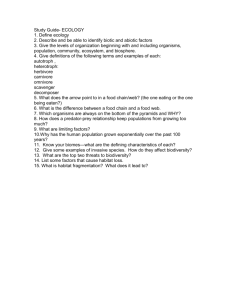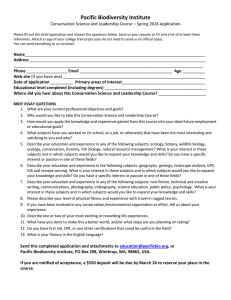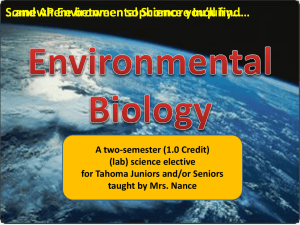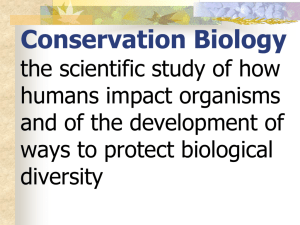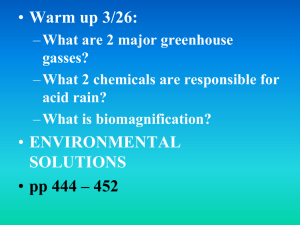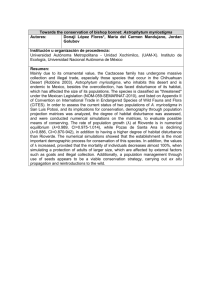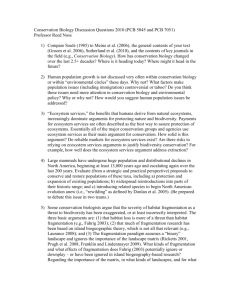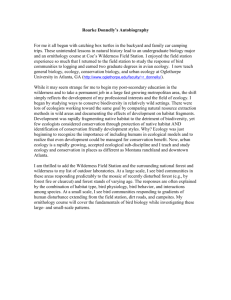Conservation Biology
advertisement
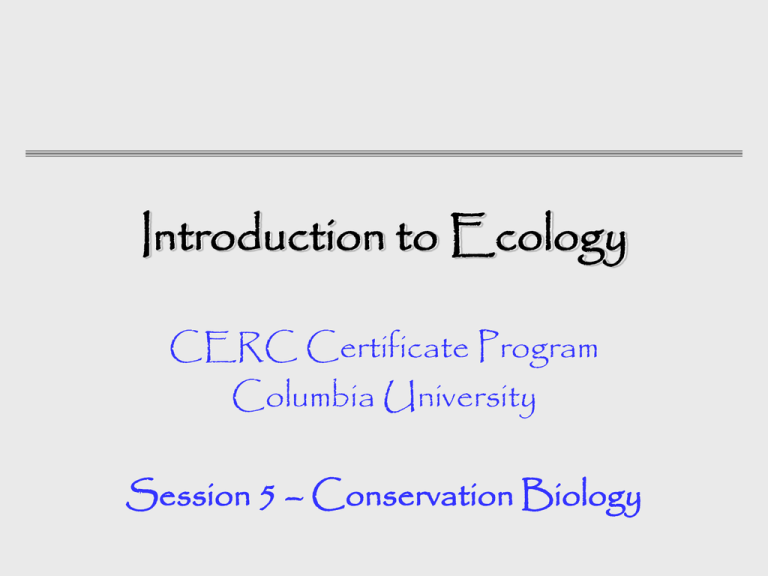
Introduction to Ecology CERC Certificate Program Columbia University Session 5 – Conservation Biology Conservation Biology • • • • • • • Goals for the day Why now? Definition of Conservation Biology Habitat Loss and Fragmentation Invasive Species Disease Ecology Ecotoxicology What Can We Do? Introduced Species Summary Project • What species did you do? – Responses? – Why did you choose the species you did? – Should your species be controlled? Why? Conservation Biology • • • • • • • Goals for the day Why now? Definition of Conservation Biology Habitat Loss and Fragmentation Invasive Species Disease Ecology Ecotoxicology What Can We Do? Global Changes • What processes are at work at present in the planet? • Examples – – – – Global Climate Change Acid Rain Spread of Pollution and Toxins Spread of Biotic Pollution • How are these occurring? – What is the generative force behind them? Global Change Cause • What is the Generative Force behind these changes? US! Human Impact • We have altered nearly all of the Earth that it is profitable for us to do so Why Now? • Why has human population growth so escalated recently? • What has happened to cause this? – When was the last large dip in world population? Conservation Biology • • • • • • • Goals for the day Why now? Definition of Conservation Biology Habitat Loss and Fragmentation Invasive Species Disease Ecology Ecotoxicology What Can We Do? Definition of Conservation Biology • Applied ecology … but with an agenda! • Is this truly scientific? – Why or why not? Agenda Items • Why should we care about conserving biodiversity? – – – – – Ecosystem Function Direct Economic Uses Indirect Economic Uses Ethical Reasons Aesthetic Reasons Agenda Items • Nearly all of these are subjective and involve value judgments – Not everyone values biodiversity – Short-term gain may outweigh these considerations • Financial, Survival • Respect others’ views? vs. Conservation Biology • • • • • • • Goals for the day Why now? Definition of Conservation Biology Habitat Loss and Fragmentation Invasive Species Disease Ecology Ecotoxicology What Can We Do? Habitat Loss • Single greatest threat to biodiversity – Approx. 50+% of all species extinctions have been involved habitat loss – Island biogeography theory predicts that around 50% of species are lost with 90% habitat loss Impacts of Habitat Modification • • • • • Loss of Habitat Habitat Alteration Fragmentation Increased Human Presence Introduced Species Impacts of Habitat Modification • Loss of Habitat – Occasionally completely • Paving - 377,810 miles in US forests only plus 44,000 m highways, plus ? m suburban, etc. – Usually remaining habitat in altered areas is suboptimal – Remaining individuals are stressed and have decreased fitness Impacts of Habitat Modification • Habitat Alteration – Remaining surrounding habitat is impacted due to use of altered habitat – E.g., fumes, pollution, from cars Impacts of Habitat Modification • Fragmentation – Key component: Edge Effects – Impacts of fragmentation percolate into interior – aridity, wind, openness, heat, change in water patterns, noise, etc. – These impacts often permeate in several hundred meters • Distance is species specific • Birds in Australia = 200+ m Impacts of Habitat Modification • Increased Human Presence – Alteration leads to more alteration – People arrive, then their influence expands and intensifies Impacts of Habitat Modification • Introduced Species – Other species come with us as we fragment – Intentionally – Unintentionally – Thought to be the second strongest force behind only fragmentation – More about these Conservation Biology • • • • • • • Goals for the day Why now? Definition of Conservation Biology Habitat Loss and Fragmentation Invasive Species Disease Ecology Ecotoxicology What Can We Do? Invasive Species • Intentional Introductions – Crops, pets, ornamentals, ranching, etc. • Unintentional Introductions – Everything else – Majority of Introductions are these Invasive Species • Impact on other species through many ways – Competition, predation, parasitism, herbivory, parasitoidism – Species need resources to survive and propagate – What does this view assume about community structure and niche availability? Rule of Tens • Not all species that are introduced are successful • Stages of Invasion 1. 2. 3. 4. Introduction Establishment Integration Dominance (or Pest status or invasiveness) Rule of Tens • Only 10% make it through each stage – – – – – 10,000 in a source area 1,000 introduced 100 established 10 integrated 1 pest – Empirical observation Transportation Establishment Integration Dominance (or Pest status) Invasive Species • Why can invasive species quickly explode in population size? • Ecological Release – The restrictions on pop growth are removed in the novel location Invasive Species • This phenomenon can also be used to our benefit • Can you think of examples? • Biological Control of pest insects – Parasitoid wasps • Erosion Control – E.g., Kudzu • CAUTION Heaviest Hit Location • Hawaii – – – – Comprises < 0.2% of total US land area Has more than 25% of US endangered species Approximately 72% of recorded extinctions are in Hawaii Hawaii has more endangered species (per area) than anywhere else on the planet Conservation Biology • • • • • • • Goals for the day Why now? Definition of Conservation Biology Habitat Loss and Fragmentation Invasive Species Disease Ecology Ecotoxicology What Can We Do? Disease Ecology • Essentially a subfield within invasion biology – The pest is usually an introduced species – Bacteria, viruses, fungi, protists, etc. • Responsible for tracking & controlling the spread of novel diseases Disease Ecology • Examples of this locally? • West Nile Fever • Malaria • Chestnut Blight • Dutch Elm Disease Disease Ecology • Novel feature here: – Need a vector (as with other Invasives) – Also need host(s) • Harder to introduce diseases as a consequence than other species • Rule of tens overestimates Emerging Infectious Diseases (EIDs) Conservation Biology • • • • • • • Goals for the day Why now? Definition of Conservation Biology Habitat Loss and Fragmentation Invasive Species Disease Ecology Ecotoxicology What Can We Do? Ecotoxicology • Definition: Spread of the scientific study of harmful effects caused by manmade chemicals to the natural environment • Of particular interest are the effects on populations, communities, and ecosystems From Dictionary.com Ecotoxicology • An essential part is the study of the movement of potentially toxic substances through food webs and through the water cycle Dictionary.com Ecotoxicology Example • • • • Floridian Feminized Feral Alligators First found in early 1990s Due to estrogen-like pollutants from sewage effluent Main chemical culprits: pesticides, industrial compounds, dioxins, & ingredients of plastics and detergents – Act to either mimic estrogen or block testosterone receptors – Suppress reproduction, by reducing their effective population size – Possibly also occurring in Humans? Conservation Biology • • • • • • • Goals for the day Why now? Definition of Conservation Biology Habitat Loss and Fragmentation Invasive Species Disease Ecology Ecotoxicology What Can We Do? What Can We Do? • Prioritize areas for conservation • Restore already damaged areas • • • • • – Called Restoration Ecology Land-for-debt swaps Ecosystem valuation Captive breeding programs Reducing our footprint Many others…. Ecological Pyramid • Trends down pyramid: – Increase in geographic scale – From single species to multiple species – Increasing number of ecological factors that may be influential – Decreasing certainty in results Population Community Ecosystem Biome Biosphere The Tour of Ecology Has Concluded • General Ecology • Population ecology • Community ecology • Ecosystem ecology • Conservation Issues – Is there any hope for the future? – You determine the answer…
